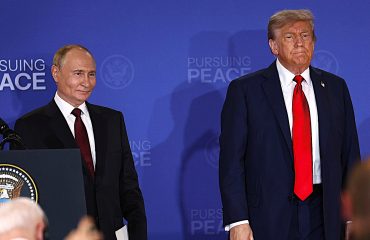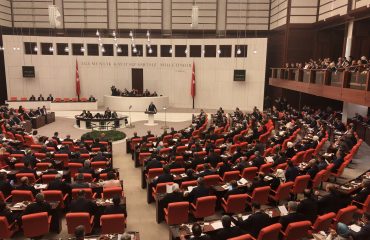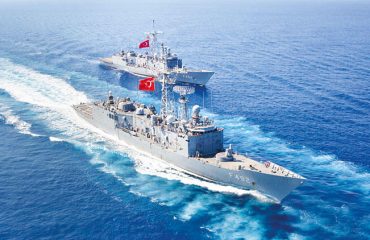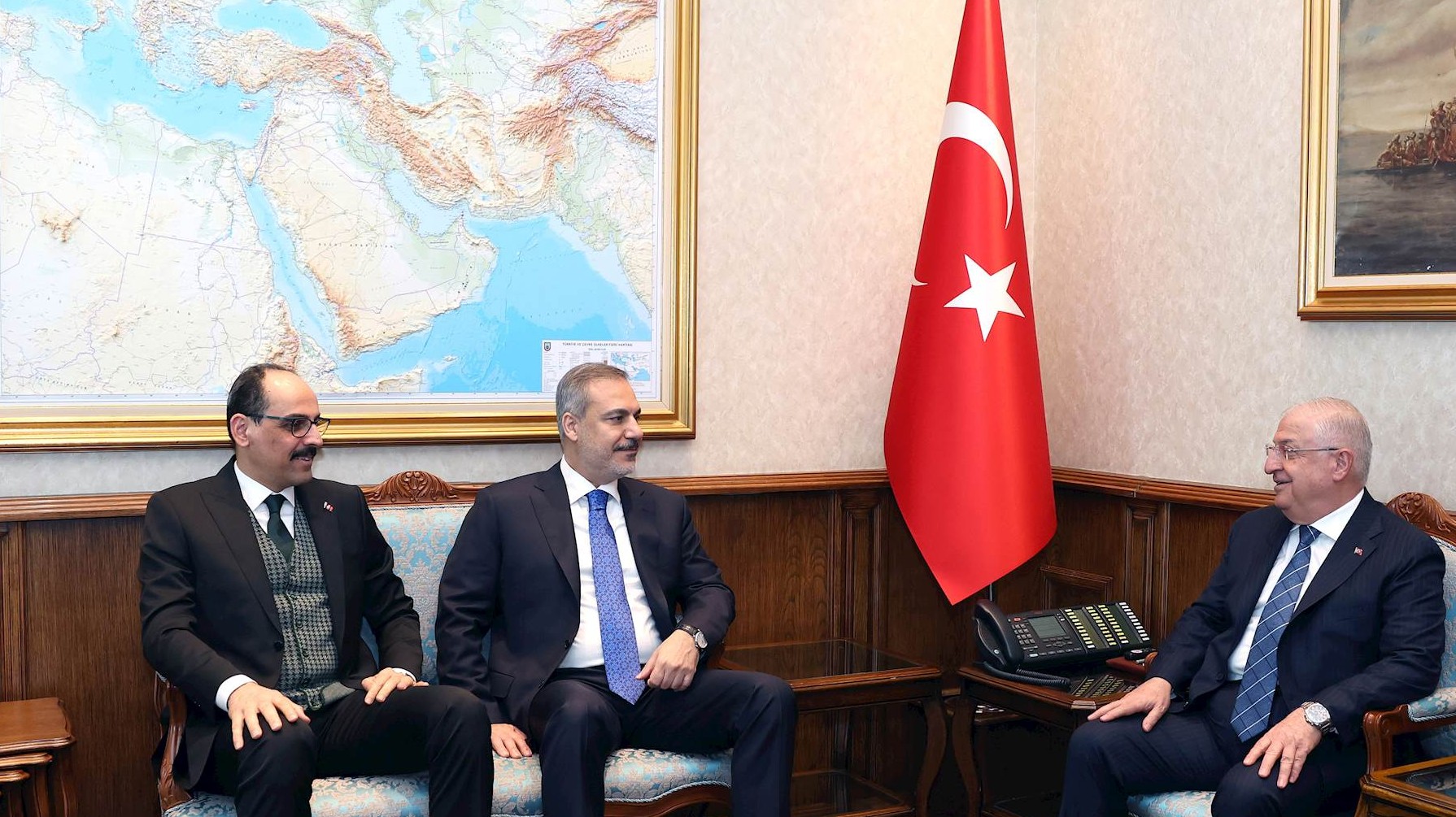
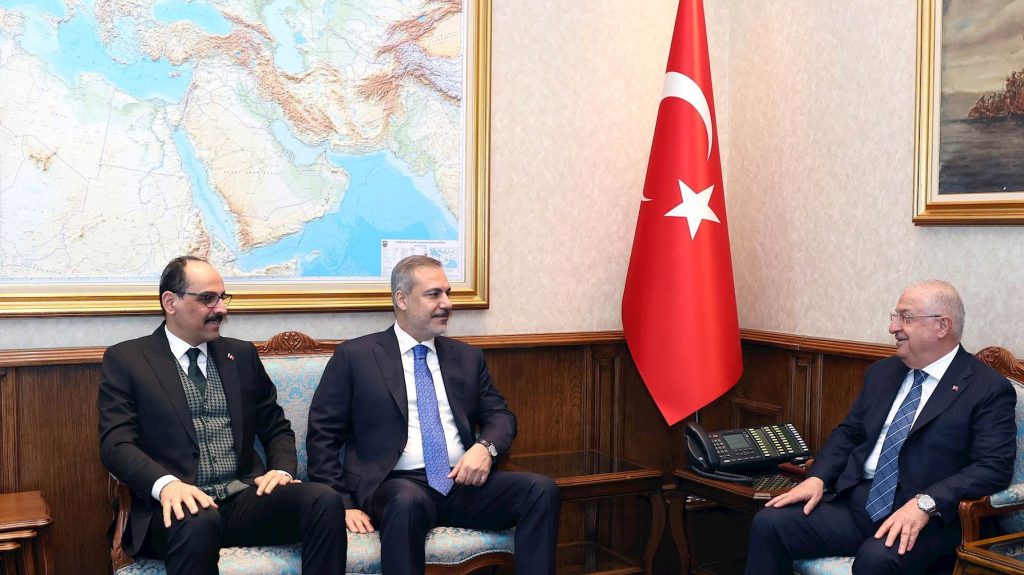
The Turkish government is trying simultaneously to succeed in disarmament of the PKK and merging into politics, and a Hamas ceasefire with Israel. The photo shows Turkish intelligence (MİT) Director İbrahim Kalın (L) and Foreign Minister Hakan Fidan (M), hosted by National Defense Minister Yaşar Güler; three key figures of Turkish security and diplomacy. (Photo: Turkish Defense Ministry)
It is understood that the meeting on June 29 between MİT President İbrahim Kalın and Hamas Shura Council President Muhammed Ismail Darwish, as announced by Turkish security sources, was conducted under four main topics:
1- The humanitarian tragedy in Gaza,
2- Turkish efforts with the international community to end Gaza’s humanitarian crisis and destruction, ensuring immediate aid delivery,
3- Facilitating reconciliation among Palestinian groups,
4- Steps toward achieving a permanent ceasefire in Gaza.
A fifth implicit topic is Hamas’s future, specifically whether it will continue as an armed group. Israel, which has turned Gaza into a “hell on earth,” continues to punish civilians for Hamas’s actions with support from the U.S. and Western Europe. The Trump administration has begun discussing the possibility of Hamas continuing its political existence if it disarms.
Disarmament of the PKK and Hamas
The idea of Hamas first achieving a ceasefire with Israel, then reconciling with the PLO in Ramallah, and eventually disarming to continue as a political party parallels Türkiye’s project (since October 2024) to disarm the PKK and integrate it into parliamentary politics.
There isn’t enough evidence to confirm whether this was the original design, but in a new Middle East framework, where Moscow and Tehran’s influence is diminishing, these two processes could be interconnected.
Simultaneously with Türkiye’s increasing engagement with Hamas, Foreign Minister Hakan Fidan says Israel-Iran peace was strategic for Türkiye, while U.S. Ambassador Barrack stated that a Hamas ceasefire is expected soon, that Israel needs “redefinition,” and that the “key lies with Türkiye.”
A New Middle East Emerging
Since President Tayyip Erdoğan’s re-election in May 2023, Türkiye’s perspective on major Middle Eastern developments through the lens of Hamas and PKK reveals parallels. Türkiye’s ability to persuade Hamas to a ceasefire, and possibly disarmament, appears to be a significant factor in shaping the new Middle East.
The imperialist Sykes-Picot agreement a century ago failed, benefiting only the oil and arms industries while the region’s people, especially Palestinians, paid with their blood.
The new Middle East seems not to be solely based on a Muslims-only basis. North Africa and South Asia may no longer be vital. The emerging equation highlights Türkiye, Israel, and Saudi Arabia, with new actors (to be discussed later in the story).
It started with the Gaza Crisis
- July 17, 2023: Hamas Political Bureau Chief Ismail Haniyeh was received by Erdoğan in Ankara.
- October 7, 2023: Hamas attacked Israel, killing at least 1,200. Israel’s continuing retaliation has killed over 56,500 Palestinians in Gaza as of June 29, 2025.
- July 4, 2024: Haniyeh talked to Turkish, Egyptian, and Qatari officials for a Gaza ceasefire.
- July 30, 2024: Fidan met Haniyeh in Tehran during President Masoud Pezeshkian’s inauguration.
- July 31, 2024: Haniyeh was assassinated by Israel in Tehran.
- September 13, 2024: Kalın met Hamas representatives in Ankara.
- September 17-19, 2024: Israel’s Mossad attacked Hezbollah in Lebanon, disrupting its leadership and cadres.
- September 27, 2024: Hezbollah leader Hassan Nasrallah was killed by Israel.
- October 16, 2024: Hamas leader Yahya Sinwar was killed by Israel.
- October 18, 2024: Fidan met Hamas Shura Council President Darwish in Istanbul.
PKK move and regime change in Syria
- October 22, 2024: Turkish Nationalist Movement Party (MHP) leader Devlet Bahçeli, an ally of President Erdoğan, called for PKK leader Abdullah Öcalan iİmralı island-prison to disarm and dissolve the group.
- December 8, 2024: Syrian President Bashar Assad fled to Russia. HTS leader “Muhammad al-Golani” (Ahmed Al Shara) took Damascus.
- December 12, 2024: Kalın visited Damascus, meeting HTS leader Ahmed Shara, becoming the first foreign official.
- December 28, 2024: Kalın met with a Hamas delegation.
- January 13, 2025: Kalın held phone talks with Hamas officials.
Trump: Good News from Türkiye
- January 20, 2025: Trump began his second term as U.S. President.
- January 29, 2025: Erdoğan received the Hamas delegation led by Darwish in Ankara.
- February 27, 2025: Öcalan called for the PKK to disarm and dissolve via the DEM Party, the Kurdish-problem-focused party in the Turkish Parliament.
- March 16, 2025: Erdoğan and Trump discussed Russia-Ukraine, Israel-Gaza, and Syria-PKK.
- March 22, 2025: Fidan met the Hamas delegation led by Khalil al-Hayya. Trump’s envoy Steve Witkoff said the same day that Hamas could join Palestinian politics if it disarms, noting there was “great news from Türkiye.”
- March 24-25, 2025: Erdoğan’s advisor Akif Çağatay Kılıç met Trump’s National Security Advisor Michael Walz; the next day, Fidan met U.S. Secretary of State Marco Rubio.
Fidan and Kalın in shuttle diplomacy
- April 9, 2025: Türkiye and Israel began talks in Baku to avoid clashes in Syria.
- April 10, 2025: Erdoğan met DEM Party’s Pervin Buldan and Sırrı Süreyya Önder, instructing Justice Minister Yılmaz Tunç to prepare legal frameworks.
- April 19, 2025: Fidan and Kalın met the Hamas delegation led by Darwish in Ankara.
- May 12, 2025: PKK announced its dissolution and end to armed struggle.
- May 14, 2025: Trump, after meeting Shara, Mohammed bin Salman, and Erdoğan (by phone), lifted Syria sanctions.
- May 25, 2025: Barrack said Syria won’t be divided, rejecting a new Sykes-Picot.
- May 29, 2025: Fidan held phone talks with Qatar’s Foreign Minister and Hamas officials.
Israel-Iran War and the PKK
- June 2, 2025: Barrack supported SDF as a U.S. ally against DAESH (ISIS); Fidan opposed continued U.S. support.
- June 2, 2025: Kalın spoke with Hamas’s Khalil al-Hayya.
- June 13, 2025: Israel attacked Iran; Iran retaliated.
- June 18, 2025: DEM Party’s Gülüstan Kılıç Koçyiğit announced a parliamentary commission for the PKK peace process before July 15, following a meeting with the Turkish Parliamentary Speaker Numan Kurtulmuş. Turkish National Defense Minister Yaşar Güler is objecting, saying that he wanted to see the PKK leave arms first.
- June 22, 2025: Trump bombed Iran’s nuclear facilities at Netanyahu’s request. Iran attacked a U.S. base in Qatar on June 24, followed by a ceasefire on June 25.
“New Israel” and Türkiye
- June 29, 2025: Barrack said Israel needs “redefinition,” with the “key in Türkiye,” expecting a Gaza ceasefire soon. Kalın met Hamas’s Darwish the same day.
- June 30, 2025: Fidan told UK Foreign Secretary David Lammy that Israel-Iran peace is a strategic goal for Türkiye. DEM Party’s Sezai Temelli expected PKK disarmament to begin in early July.
This diplomatic traffic is expected to intensify in July. The phrase “redefinition of Israel” is noteworthy. It doesn’t seem to imply physical border changes, but statements shift rapidly in this fluid period.
The New Middle East and New Actors
The new Middle East may exclude North Africa beyond Egypt or Libya but include Azerbaijan, Armenia, and possibly Georgia, extending to the shores of the Black Sea and the Caspian.
Azerbaijan is now also a Middle East actor. Despite Türkiye cutting trade with Israel during the Gaza crisis, half of Israel’s oil flowed through the Baku-Tbilisi-Ceyhan pipeline. Azerbaijan facilitated Türkiye-Israel talks on Syria. SOCAR acquired 10 percent of Israel’s Tamar gas field on June 7. Azerbaijan-Armenia peace talks neared completion, with Armenian PM Nikol Pashinyan visiting Erdoğan in İstanbul on June 20, following Azerbaijan President İlham Aliyev’s visit on June 19.
Türkiye’s success in the Hamas and PKK processes is likely to be a strategically important factor in the shaping of the new Middle East.
